|
|
DAR-UL-ISLAM.
A RECORD OF A JOURNEY THROUGH TEN OF THE ASIATIC PROVINCES OF TURKEY
London: Bickers & Son, 1904
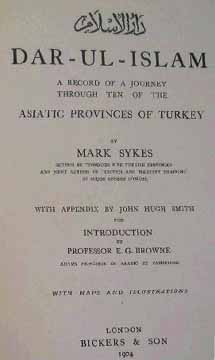
The title, DAR-UL-ISLAM means "the Home of Islam", at this time
comprising parts of the Turkish Empire. This is a fine classic travel book
covering journeys from Damascus to Aleppo, through the Diyarbekir area to
Mosul and thence to Van and Tiflis. The appendix by John Hugh Smith is his
diary of a journey from Aleppo by way of Deir Zor and the Khabur, to Urfa
where he rejoined Sykes. Often interesting illustrations showing people,
views, countryside, buildings, ruins, etc. Mark Sykes was the co-creator of
the Sykes-Picot Agreement of 1916 which more or less created modern Iraq out
of Mesopotamia and the disintegration of the Ottoman Empire.
What follows is a gallery of images from "Dar-ul-Islam,"
as well as excerpts on Mark Sykes from another book. Mark
Sykes ironically went on from being one of the few "fair" Westerners
as far as outlook on Turks, to producing anti-Turkish propaganda for
Wellington House, to be culminated with the final blow, an engineer of the
dismemberment of the Ottoman Empire. (Hear the
last one, as described in the film, LAWRENCE OF ARABIA.)
|
|
|
| CHAPTER
VII (p. 69-81) |
TO ZEITUN CITY
THE longer one stays in the Taurus, the more one pines for some district where the
population is not composed solely of Osmanlis and Armenians. It is too depressing to find
a country inhabited solely by dullards and sneaks: the dullards so dull that if the angel
Gabriel walked into one of their villages trumpet in band and announced that the end of
the world had taken place three weeks previously, the only answer he would receive would
be’ Evvet Effendim.’ The sneaks are so cowed that they are hardly noticeable.
In every other part of Turkey, life is lightened by the presence of some other race,
Kurds, Circassians, Arabs, &c. In the company of these, Turks * are cheerful and
amusing, their character shows itself, and one can judge them better; but when their only
neighbours are sworn enemies, the Armenians living in deadly and hopeless fear of them,
they become so sulky and empty-headed that one grows hysterical with impatience.
One curious point about Turks is the difficulty they appear to experience in pronouncing
the consonants of
* Since writing the above I have travelled in Anatolia, where the Turks
live alone. I found them the most delightful people I have ever met, besides being very
intelligent.
|
|
proper names; there is nothing so exasperating as extracting the names of villages
from the Zaptiehs or inhabitants.
Q. What is that village over there? A. Awarot-loo-oj.
A. What?
Q. Awany ouroo loo-oj-oh!
A. What?
Q. Awarngourouloo-oh- oh!
A. What?
Q. Awarnunginjoolooroh oh la ho!
Q. Now one syllable at a time while I write it down.
A. Ha-jin-ogh-loo.
Q. Hajin Oghloo?
A. Yes.
They suffer the same disadvantage in either writing or pronouncing English proper
names.
After five days’ stay we left Marash for Zeitun, stopping the first night at Batsh
Khan.
The scenery between Marash and Zeitun is of the ‘terribly’ impressive order in
winter, the ground bare, the trees leafless, and the mountains shining with frosted
snow; stunted oak, swart dwarfish pines and an occasional noble cedar form the whole
desolate vegetation. This extends over immense vistas of rocky mountain land, and
although not beautiful has an effect which 1leases more than one would expect.
At Paj the bridge which spans the river is guarded by a small detachment of soldiers,
whose general aspect of forlornness and boredom reminded me painfully of the many
weary months spent in a similar position in South Africa. They were well guarded by
some fine dogs, who bayed loudly on the approach of any strangers.
|
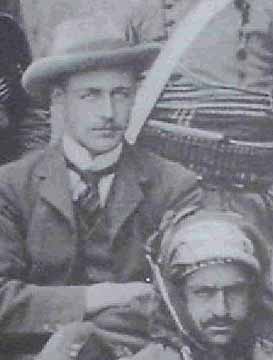
|
|
Sir Mark Sykes, with Halil Sian.
(See group shot below)
|
On my arrival at Zeitun I was received with
great kindness and ceremony by the Commandant of the Castle, who, besides being a very
efficient soldier, was a pleasant host. I was led up to his sitting-room, where we
discussed every topic under the sun—the South African war, Crete, German railways,
etc. While the conversation was in progress three Orderly men marched in, the first
bearing an immense caldron of soup, the second a hillock of rice and meat, and the
third a basket of loaves. These were brought before the Commandant, who proceeded to
taste them, and proffered them for my inspection. I can certainly answer for the
rations being of ‘sufficient quantity and proper quality’ on that day, the bread
being especially excellent, though I am afraid my friend Thomas would have turned up
his nose at it.
I subsequently learned that the Commandant was a very remarkable man. He took over the
command three years ago, apparently a very unassuming, dignified individual, by no
means energetic. The Circassians who lived in the vicinity, and the more thievish of
the Zeitunlis, thought the moment favourable for a little cattle-lifting and caravan
plundering; this venture was by no means a success, for lo! the thieves were laid
speedily by the heels, and instead of going to the country gaol, where they usually
bought their liberty, the quiet grey-bearded colonel ordered them to be flogged. This
was a most unpleasant surprise, for hitherto Circassians had been somewhat favoured,
and thefts on their part were treated as little childish vagaries, owing to high
spirits; but in Takhsin Bey they met a master both severe and just. He pointed out to
them that in gaol they wasted their own time and devoured the food of the State, while
a flogging did them no harm and cost nothing. Fearful threats of revolution and
massacre were muttered by these gentlemen as they returned home rubbing their aching
backs; but when their friends saw those portions of their anatomy which had been
subjected to the lash, they perceived that the cultivation of their lands and the
pursuits of peace were more profitable than the amusing but dangerous peculations I
have referred to.
|
| What the end of
the revolution would be these (Armenian) desperadoes recked little, so long as the
attention of Europe was drawn to their cause and their collection-boxes. (1895) |
The result of this excellent policy has been to secure for the district of Zeitun a
tranquillity hitherto unknown, which shows that a just and stern government is all that is
required to reduce the most turbulent and truculent orientals to order.
The Commandant is wonderfully popular with all the surrounding people, who are, for the
first time in their knowledge, reaping the benefit of a sure and straightforward rule. He
favours no one and is beloved by all; the battalions under his command are well clothed,
smart, and efficient; the officers are kept up to the mark; and, while very respectful to
their chief, are on excellent terms with him and loud in his praises. It is providential
that such a competent officer has been given the command, as Zeitun has always been a centre
of disaffection and unrest.
The last insurrection was an excellent demonstration of what a pass an incapable officer may
bring about, and serves as an illustration of the methods of the revolutionists. The
following is as accurate a history as 1 could gather from various sources on the spot.
Some Revolutionary Society, not being satisfied with the general state of affairs in Turkey
and scenting collections and relief funds in the future, judged it expedient in the year of
grace 1895 to despatch certain emissaries to Armenia. On the warlike population of Zeitun
they pinned their hopes of raising a semi-successful revolution, and six of their boldest
agents were accorded to that district. What the end of the revolution would be these
desperadoes recked little, so long as the attention of Europe was drawn to their cause and
their collection-boxes. These individuals, however, found their people by no means ripe for
insurrection, and their influence was but small. True, there were certain persons ready to
talk sentimentally and foolishly, possibly treasonably, but in no way prepared to rise
actually in arms. However, an opportunity of embroiling their countrymen unexpectedly
presented itself, by taking advantage of which they succeeded in forcing the hand of the
Government.
It happened that a number of Furnus and Zeitunli Armenians were in the habit of going to
Adana for the purpose of earning money as farmers and handicraftsmen; for some reason, the
Government at that time issued an order that all strangers should return to their own towns
and districts. The Furnus and Zeitunli Armenians were enraged at this action, saying that
they were not permitted by the Padishah to earn sufficient to pay their taxes, which they
considered exorbitant; consequently they were foolish enough to pillage some Turkomans on
their way home.
The Turkomans addressed themselves in complaint to the Mutessarif of Marash, who decided to
investigate the affair by a commission consisting of a Turkish Bimbashi (field officer) and
an Armenian resident, escorted by five Zaptiehs. The agents saw in this move a chance of
bringing matters to a crisis, and either attacked, or persuaded the villagers to attack, the
commission, killing the Bimbashi and three of the guard, and carrying off the Christian
commissioner with them. The surrounding Armenians, knowing themselves to have been
originally in the wrong, and seeing themselves hopelessly compromised, accepted the
inevitable and joined the revolutionaries.
The Government of Marash, having been informed of this affair, despatched a company of
infantry to reinforce the garrison at Bertiz. The rebel leaders and their followers
intercepted this party, and an undecided action resulted, owing to the assistance given by
the Moslems of Bertiz. The next day the revolutionists decided to attack the garrison at
Zeitun in order to force that town (whose inhabitants had but little inclination) to join a
jehad against the Osmanli. After a brief resistance the Castle surrendered, through the
incapacity of its besotted commander.
Having gained a victory of some importance, the Armenian force proceeded to the Kurtul
district, where they plundered and sacked several Turkish villages, eventually seizing
Anderim, where they burnt the konak. On their way back to Zeitun they committed some most
disgraceful murders at Chukarhissar * in commemoration of the decease of the late Armenian
kingdom, which was finally ended at that place.
* I was told some ghastly details, but I doubt the veracity of them, as they
were related to me by a town Armenian, who recounted them with honest pride.
|
...although certain ‘outrages’
* were committed by his (Ali Pasha's) troops during the march, I do not think that he is
in any way to blame for the conduct of the campaign.
|
After this anarchy supervened. The Moslems and Kurds, infuriated by exaggerated
reports, lusting for treasure of the wealthy but feeble bazaar Armenians, massacred
and overwhelmed them at Marash and elsewhere. The Turkish Government, now thoroughly
alarmed, had concentrated two divisions, one at Marash, under Ferik Pasha, who showed
an extraordinary incapacity during the massacre; the other under a reliable soldier,
Ali Pasha, at Adana. The latter with considerable promptitude swept forward towards
Zeitun, driving before him the Armenian population, and although certain ‘outrages’
* were committed by his troops during the march, I do not think that he is in any way
to blame for the conduct of the campaign. It would have been a grave military fault to
have left a hostile population in his rear; and the Armenians he called upon to
surrender were already too overcome by panic to accept terms, and either awaited
destruction in their villages, resisting to the last, or fled to the town of Zeitun,
where the revolutionary agents, in order to maintain their prestige, were cramming the
population with absurd falsehoods of a British relief column landed at Alexandretta.
One of them even sent out messengers, who returned with hopeful letters which he
himself had written. But this impostor and his colleagues were not satisfied with the
general disloyalty of the inhabitants, and felt that some deed should be committed
which would absolutely debar the people from any hope of mercy from the Government.
Accordingly, they assembled the
* These would not be so called if committed by any other troops than
those of the Turkish Army.
|

Yussuf Shamali (Cook).
Mustapha Kurdi.
Jacob-el-Arab (Mr. Sykes Servant).
Yussuf Haddad (Dragoman).
Mr. Sykes.
Yussuf Hadad (Dragoman)
Halil Siam.
Nikola.
Mr. Smith.
Halil K. Taifeh.
Hero.
Chello, the Dog
Mohammad Ali.
Mohammad the Persian.
N.B. - The Child is no relation of any person in the picture, but one put in by the
Muleteers to bring good luck.
|
refugees driven in by Ali Pasha, and repaired with them to the konak, where the
imprisoned garrison was quartered. and proceeded to murder them with bestial cruelty.
It must be remembered that this piece of villainy can in no way be imputed to the
population of Zeitun, but to the disgraceful ruffianism of the revolutionaries and the
crazy fanaticism of the exasperated and hopeless villagers. It must also be recorded
to the credit of the Zeitunlis themselves that after this abominable butchery several
crept into the yard and rescued some seventy soldiers who survived beneath the corpses
of their comrades; fifty-seven of these were handed over at the end of the war, it is
a relief to find in all these bloody tales of Armenia such noble deeds of kindness on
the part of Christians to Moslems, and Moslems to Christians, and that nearly every
massacre can bring similar cases to light.
After that foolish slaughter the revolutionary agents may have plumed themselves on a
striking piece of policy. Zeitun was compromised beyond recall, and the town prepared
to withstand the siege to the last; but here the chapter of Zeitun closes, for within
three weeks Edhem Pasha, a noble example of what a cultivated Turk can be, arrived on
the scene, and with the assistance of the European Consuls concluded an honourable
peace with the town; containing, alas! a clause by which the miserable causes of all
this unhappiness and bloodshed were allowed to return unmolested to Europe, where they
probably eke out an existence as distinguished as their military adventures.
It would appear a grave fault on the part of the Powers to have allowed the
revolutionary agents to escape, for had these wretched bungling intriguers been
hanged, as they richly deserved, it would have strengthened the hand of the
Ambassadors at Constantinople. It would also have completely dashed the hopes of the
Armenian secret societies, who, no longer misled by the sentimental gush of certain
journals, would have perceived once and for all that, though the Powers prepared to
stop massacres, they were in no way ready to assist those who wantonly provoked them
for their own ends.
As to how far the Turks were in the wrong, who can judge? They have a side which
should be considered, as it is impossible for them to allow a revolution to be
impending in the heart of their country when threatening enemies appear on every
frontier. They have their own homes to consider, and if they had allowed the
revolutionaries to continue their intrigues, there is little doubt that a formidable
insurrection would have broken out whenever the moment was favourable. Also it must be
borne in mind that in the event of an Armenian rebellion it was the intention of the
conspirators to have perpetrated similar massacres; and while no excuse can be made
for the conduct of the Turks in slaughtering Armenians, it should be remembered that
massacre is still a recognised method of policy throughout the East, and until lately
in the West. Why, indeed, should one say lately, when the behaviour of the allied
troops at Pekin is a matter of to-day?
|
(Armenian)
revolutionists from abroad were always prepared to provoke a massacre in order to induce
the Powers to assist them...
these wretches actually schemed to murder American missionaries, hoping America
would declare war... |
The necessary killing in India after the Mutiny, although carried out more formally, was
just as merciless; and from all one can gather the gentle Skobeleff pacified Central Asia
much as the Turks aborted the Armenian revolution.
It is also a fact that the Armenians have an extraordinary habit of running into danger
without possessing the courage to face it, and the revolutionists from abroad were always
prepared to provoke a massacre in order to induce the Powers to assist them. I have good
reason to know that these wretches actually schemed to murder American missionaries, hoping
America would declare war on the supposition that the Turks were the criminals. Therefore,
with such sordid intrigue and ruthless policy running side by side, it is hard to judge. I
have known one man of Turcophil views eventually reject his opinions in horror; again, many
others almost fanatically in favour of the Armenians, became so disgusted by the baseness of
their nature as to abandon them with satisfaction to their fate.
Personally I think that the public moral sense of Europeans is practically wanting in
orientals, and unless this is assumed one cannot attempt to comprehend them meaning that an
oriental is capable of all personal goodness, such as acts of personal friendliness,
personal devotion, personal self-sacrifice, and brotherly love to those of his own creed—such
virtue as is exampled in the highest type of pro- Boer ; * mercy to one’s enemies and
mercy in public matters are absolutely lacking. Whether this is a defect, and, if it is a
defect, whether it can be remedied by education, or whether it is caused by race or
religion, arc questions which must be left to philosophers and men of science.
In the evening I took a turn round the Castle walls,
* I am not one myself.
|
An Ottoman-Armenian Zaptieh
(Policeman):
"I have killed many (Turks)."
|
and had the satisfaction of seeing a splendid sunset over the valley, the river
winding like a silver ribbon down the immense avenue of snow until it was lost in a
blue haze, above which the huge tumbled peaks stood silhouetted against a golden,
cloudless sky.
The next morning I visited the city of Zeitun, and I think I never
saw or smelt a more squalid, filthy, disgusting sink; although inured to the ten
thousand putrescent odours of the East, I was miserably defeated at Zeitun; so
appalling was the stench that I was unable to stay in the town for more than fifteen
minutes, therefore I cannot give any description of its buildings, parks, squares, and
palaces. The inhabitants, some eight thousand in number, deserve mention on account of
their courage, in which they happily differ from the rest of their brethren. They once
had the reputation of being fine brigands, but that side of their character seems to
have evaporated.
I was able to get on easy terms with one Zeitunli, and he was a Zaptieh in the
Government service. His tale was as follows :—
‘Seven times have I fought the Turks, and now I am in their service to keep the
peace; I have killed many in war—so many I pray God will forgive me! And the Turks
killed many of us—our women, never! Never did we touch any of theirs, or they any of
ours; but for men there was no quarter, either for us or for them. But what care I? In
battle I forget where I am, and kill and kill, and may the Lord Jesus Christ have
mercy on me, whether I die in bed or in battle!’
He was as unlike the town Armenian as it is possible for any man to be: six feet two
inches high, broad in proportion, with merry, twinkling eyes, which reminded me so
forcibly of certain islanders I have met in the British Army, that I could not but
think of one private who had been a noted Fenian, and on being asked what his
political opinions were, retorted, ‘As long as I’ve this * red coat on I’m for
the Queen, God bless her! an’ when I haven’t —well—’ (with an irresistible
smile), ‘begod I don’t know what I am!’
At present everything appears very quiet, and there need be no reason to expect
further troubles, unless the garrison is lessened or the Commandant superseded by a
less competent one, such as the colonel who surrendered during the last insurrection.
At Zeitun I attained the rank of a Brigadier General; sentries presented arms with
hoarse cries wherever I passed, soldiers shuffled uneasily if I looked at them, and a
clay-and-night sentry was placed over my luggage. However, an Arab sergeant did not
approve of this, and indulged in the following soliloquy towards the world in general
while looking at my luggage; and the following dialogue ensued between him and my
servant:
|
| |
JACOB AND THE DISCONTENTED SERGEANT.
Sergeant: Ha! ha! many salaams, many compliments, for a stranger who travels in a strange
land Who pays for this? Himself? Nay, his Government! Who would travel in this accursed
frost-bitten country in winter unless to seek out secrets? He learns the road; he is a sure
guide for invading armies. The English are coming, Mashallah! They make maps of the roads
ere they strike,t find we, forsooth, must salaarn
I find it impossible to render phonetically the subtle dental th.
· · t Indeed Mashallah! and again Mashaliah!!I
· and give assistance. It was not so under Sultan Abdul Aziz!’
Jacob: ‘What say you, O brave one?’
Sergeant: ‘I say what I say! a word—who pays for thee and for this stuff? List to his
answer, men !’
Jacob: ‘Who pays me ?—my master Wallahi! a fool’s question!’
Sergeant: ‘He pays thee perchance, but who pays him?
Jacob: ‘God hath granted him money, which I Alhamdolillah, share! No one payeth him.’
Sergeant: ‘Ah! that is thy tale; mine is different. I say he cometh here to work as a
scout, a forerunner a path-finder, and I say his Government payeth him!’
Jacob: ‘And I say thou art a windy fool!’
Sergeant: ‘ I a fool!’
Jacob: ‘Truly a fool, son of a fool, and a father of witless fools !‘
Sergeant’: ‘You are bold, my fair youth!’
Jacob: ‘Yes, I am bold!’
Sergeant’: ‘I am a soldier of Abdul Hamid; would you have me tell these Moslems that the
soldiers of the Sultan are fools?’
Jacob: ‘Would you have me tell the Bimbashi how much weight you gave me as seventeen
rottals of barley this morning?’ (collapse of Me Sergeant.)
Sportsmen who read this book should note that splendid ibex, lynx, panthers and partridges
are to be obtained near Zeitun, while the route from Ekbes to Marash is stocked with boar,
teal, snipe, wild duck, and panthers in great quantity.
* Sultan Aziz is dragged in, in and out of season, to compare with the
present régime.
A Gallery of Images from "Dar-ul-Islam"
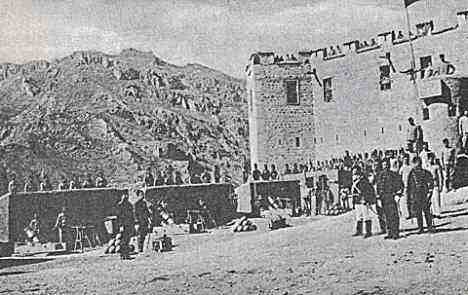
Battery overlooking Zeitun City
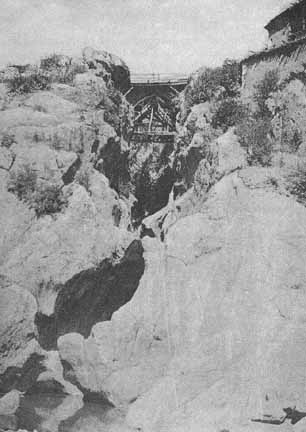
Bridge at Zeitun
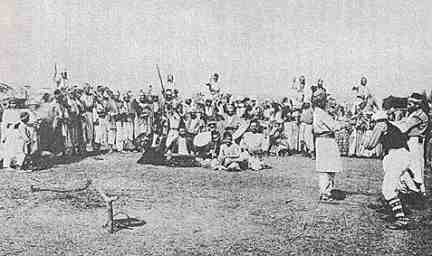
Kurd Feast at Marash
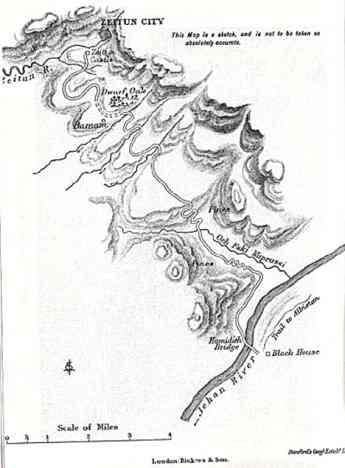
Map of Zeitun
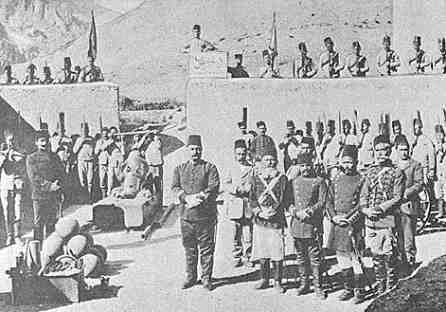
Officers of the garrison at Zeitun
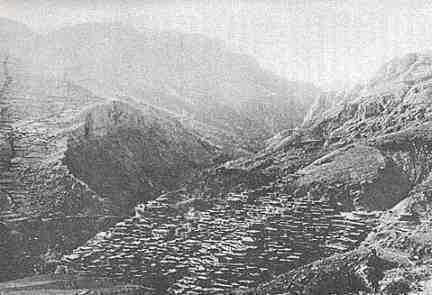
Zeitun City
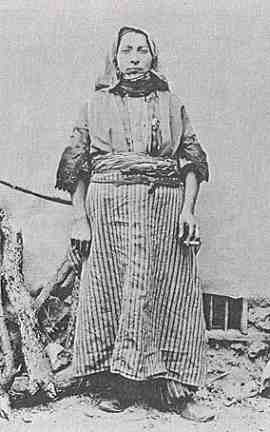
Zeitun woman
(With thanks to reader M.
Mersinoglu.)
|
A Chapter
on Mark Sykes
|
The following bits are from Syke's biography, "Mark
Sykes: His Life and Letters," by Shane Leslie, 1923.
pp. 90-93:
“…The convert deludes his American pastor. The American missions demolish and
destroy what is most precious.” At Homs he was glad to find that the Jesuits, who
train the Uniates, “give no encouragement to that brawling spirit of vendetta so
dear to the heart of the native Christian.” The Uniates, “while following most of
their Oriental ritual, abandon the fundamental points of controversy.” They
congratulated the Greeks on their feasts and even called the Moslems in Bairam.
Imagine Orangemen and Hibernians complimenting each other on St. Patrick’s Day and
the Twelfth of July! In the Fellaheen of Syria he described something akin to the
Irish peasantry before the Famine : “Good, gentle people, cultivating the land
excessively ill, squeezed most cruelly for taxes. Owing to their ignorance of
sanitation, they fall heavily before cholera. Naturally a peace-loving people, they
have been forced by circumstances into a state of semi-war which has rendered them
hardy, tough, frugal. Though moral, They are coarse in their similes, loving wonderful
fairy-tales of poor men who become incredib1y rich by the aid of talismans.” He took
down stories showing the family likeness between Irish fairies and Eastern jinns. “Every
Syrian has something of a poet, a philosopher and a rhetorician in his composition,”
he wrote in his “Five Mansions of the House of Othman.” He wished them immunity
from a designing Imperial boss who might reduce them to serfdom for the purpose of
filling his pockets and gaining the name of Empire maker.’’ He contrasted the
deserts of South Africa, “where man is an uninteresting cipher, but in Syria every
stone has an interest, every hill has been trodden into paths. Man has left his marks
on every rock, and every stage of early society is to be seen: the cave-dweller, the
nomad, the semi—nomad the villager, the townsman.”
Amongst the inscriptions he found was one on the tomb of a pessimistic poet (Abu’l-Ala
al-Ma’arri): “ Here lies the crime of my father uncommitted by me” ! He began to
make unusual comparisons between the Turks and Armenians. In the Armenian church “the
books are tattered and torn, the altar is foul and filthy, the pictures are vile
daubs; the congregation is numerous, but of prayers or outward piety you see or hear
little. They go to hear their language, to hear their native songs, to see that which
is in their opinion the last sign of what they imagine was their great all-conquering
Empire.’’ (“The Five Mansions.’’) He found there was something to be said
for the Turks in spite of the fact that Murray’s guide says that they are hated by
every race and creed.’’ Turkish rule had freed Syria from Bedouin attack. “The
average Turk is as honourable as the average Englishman when he receives his pay, and
as dishonest when he does not.” As for the massacres, “ while no excuse can be
made for the conduct of the Turks in slaughtering Armenians, it should he remembered
that massacre is still a recognized method of policy throughout the East and until
lately in the West. Why, indeed, should one say lately when the behaviour of the
allied troops at Pekin is a matter of to-day?” At Malatia he learnt the usual tale
of Armenians preparing a revolution and being massacred themselves. They even fired on
the Fransiscans escaping from their convent “in hopes of killing a European and so
forcing the hand of the Powers.” They seemed without hope. The Armenian
revolutionaries prefer to plunder their co-religionists. The revolutionary societies
are leagued one against the other; the priests connive at the murder of a bishop; the
national church is divided at its foundations.” (“The Five Mansions.”)
He made sketches to replace the useless maps, Essengeli, imagined with a query, he
realized. At Shaykli he found twenty Trappists (“French dervishes”), who supplied
him with the local Topography. Near Derendeh he visited the Hittite lions, which he
described as “fine examples of early impressionistic work. These lions have every
advantage of the early Rodin school: they are repulsively ugly, hopelessly misshapen,
their mouths are growing in the middle of their chests, and, further, they bear no
more resemblance to lions than the bandy-legged, sinewy, simian, green gentleman at
South Kensington doews to St. John the Baptist.”
The fortitude of the Turkish soldier won his respect and almost his reverence. “The
Turk has something in his nature which may astound the world yet.” He described the
old school of Turkish official: “Ignorant, uneducated, corrupt as one of ‘Queen
Anne’s statesmen, half Falstaff, half old woman; courteous, nervous, conceited,
ready to sell his soul for a little money, fond of children, dull and obstinate as a
mule yet rather lovable withal.”
Another type whom he described in his first book is worth reading, the Gendarme, or Zaptieh.
“He rides, jobs, carries the post, fights, and occasionally makes an arrest. He is
one of the chief features of the Turkish Empire; but to the greater number of
untravelled Englishmen he is unknown. If he is seen he is taken for a soldier, which
he is certainly not. A Quaker would not be more shocked than he would if you asked him
if he were one. And yet what is he? If you talk of fighting his eyes blaze, He tells
you how he alone would fight twenty Bedouins, and so I believe he would.”
|
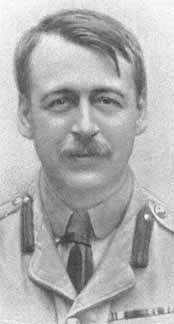
|
|
Sir Mark Sykes
|
At Zakho he saw a British Lee-Metford in a
shepherd’s hands, and was carried into reverie. “What a history it could tell!
Probably stolen near Peshawar, sneaked to Cabul, drifted to Suleimanieh, sold, stolen,
smuggled and hugged over three thousand miles of the most wonderful country in the
world.”
He found himself “dodging war parties all day long‘‘ and making up maps all
night.” He was mistaken for an English pasha, a spy, or the King of England’s
daughter in disguise! He realized that the Oriental was unfathomable to one like
himself “If a ring-tailed baboon talking English, riding on a white elephant,
accompanied by two policemen, were to enter a Yorkshire village and quarter himself in
one of the houses, what impression would he get of…
|
| "(Turks) were at least as good as many Christian gentlemen
that one knows." — Rudyard Kipling |
pp. 98-99:
DIARBEKIR. I have had a fearful time in the snows, temperature 12 degrees below zero. Two
English girls passed through here about four months ago, which seems odd. Their baggage
consisted of one tent, one revolver and a saucepan. I roared with laughter at the idea of
the vote of thanks for Lord Middleton. Well, I wish them joy. I wish I could go to
Parliament. I would if I knew what I was, but I will content myself with writing for a time,
and then if people think me a Conservative from my writing, I’ll be one, or vice versa.
Meantime, Mark’s new book was written. When “Dar-ul-Islam” appeared, Arnold White
wrote in the Sunday Sun: “Since Mary Kingsley no writer of travel has blended a
strong personality with so much of the appetizing salt of humour. The true state of the
Turkish Empire is revealed in this book of infinite jest. Freedom from prejudice, however,
and knowledge of the world do not change our Yorkshire captain into a cosmopolitan
Englishman.” The Spectator wrote: “Books of travel are of three kinds. There are
the learned books and the ignorant books and the books written by Captain Mark Sykes. These
last it is impossible to describe except in French; they are étourdissants. But they
are also the East, the surface of the East.” The Athenaeum regretted that in a
footnote “he goes on to casually describe what will be taken by many to have been a murder
of a Russian consul as a mere instance of a European receiving his reward.” Vanity Fair
compared his footnotes to Gibbon’s as the “unobtrusive resting-places of some of the
most delightful remarks.”
Rudyard Kipling wrote (May 6, 1904): “Having formally to acknowledge ‘Dar-ul-Islam,’ I
sat down to read it and stayed there for the rest of the evening. Thank you very much indeed
for it. I don’t know Turkey, but I can see the chit and the delay and the confusion at the
wayside serais as I can smell the smell (much like ours in India, I take it) of the
towns. What you said about the cold in ‘warm’ countries went to my bones. Nothing is
colder than the East when she chooses. I am very glad you like the Turk. I’ve met a few
uncontaminated ones, and they were at least as good as many Christian gentlemen that one
knows. Altogether I found it a delightful book, for which I thank you once again. You ought
to have been born in the East.”
H. G. Wells wrote (May 7, 1904): “I’ve just been looking through ‘Dar-ul-Islam,’ and
I perceive it’s going to be a great lark to read and that I’m going to learn things. I
like your ‘down’ on civilization and suchlike.”
On one point Mark was sensitive: as to whether he had covered new ground or not. When the Express
denied it he wrote:
The route between Qal’a Sharqat and Altun Kopri has never been traversed
before to my knowledge. Layard, it is true, went somewhere near it. The district between ‘Amadiya,
‘Agra, Zibar and Ruwaadiz is very little known. I naturally did not make sketch maps of
country already carefully explored. I am almost certain that no one has passed over the mad
from Qasr-es-Slib to Basin Vira and Kondik.
|
"...beware of anyone who
has been educated by American missionaries. They always rub officials up the wrong
way."
|
pp. 192-93:
… Erzerum and elsewhere, and the Kurdish cavalry of Ibrahim bear no resemblance to
the Haideranli Hamidieh of Hamid Pasha of Van.” He certainly gave a new conception
of the Turk. “Both the Unspeakable Turk and the Dear Old Turk are phantoms of the
imagination. Mr. Gladstone and the missionaries made one, Mr. Creasy and the Crimean
officers the other.” His definition of the Turk was “a Moslem whose native
language is Turkish.” On the country itself he advised Englishmen briefly: “Turkey
is no go except for a financier or a canal engineer of remarkable capacity. The
country is overstocked with incompetent, underpaid officials. Englishmen would be well
advised not to go unless they are prepared to be chucked at a moment’s notice, to
have their salaries six months in arrear, and to bow their necks to Oriental masters.
Turks are delightful hosts, hut I should not fancy them as employers.”
Hints for travelling in the East appeared in a letter to Mr. H. P. Gordon, of the
British School at Athens:
December 10, 1907.
I used to make no secret of what I was doing and used to photograph everybody and
everything, sketch the roads on a cavalry sketching-case, take altitudes and bearings,
use Turkish soldiers to mark base lines, and never was prevented, though I believe the
Sublime Porte once said I was mapping the whole country. However, there are things to
avoid. Never sketch metalled roads, never approach any building where Government
property is kept, such as ammunition, tents, guns, or rifles. Never ask permission to
enter these places. Never sketch near the coast. Never sketch on Crown lands, called
“Chiftlik.” Never let your sketching materials or implementts be seen at the
Custom House Always stop sketching when approaching a large city. Never mention your
business, or ask permission to sketch from the governor of a province or any of his
satellites. Never go anywhere without a policeman (zaptieh). Those are the things not
to do. Now here are the things to observe: Always make a visit to the Mudir, Kaimakan,
Mutesaril, or chief official of the place in which you happen to be, then call on the
commander of the military, then go to your tent and await their return visit (note,
always send a messenger “ Khaba” before calling), give your visitors coffee, take
their photographs, talk about international politics, talk about local agriculture,
show them your picture-book if you have any, ask for a local policeman to show you
round. They will then report that an English spy travelled in their district and that
they kept him under close observation. Always tip your policeman handsomely; two
francs a day for one is not excessive, for he will do a great deal of work for you.
Avoid the local Christian priest unless accompanied by an officer of the Government.
This saves a great deal of trouble unless you are engaged on political work. If you
ask the local priest to dinner, ask a Government official as well. This is in the
priest’s interest. The farther you go East, the more complacent the authorities
become. Now as to your business, you will find more difficulty in Syria than in
Mesopatamia, so I should advise you to go to the Euphrates first. When you get to
Syria, if you are interfered with you can say: “But I did all this in Mesopotamia,
how ridiculous to prevent me here!” And from what I know of Turkish officials this
has an effect, because someone else is committed, and then it doesn’t matter. An
intelligent and reliable servant is essential; beware of anyone who has been educated
by American missionaries. They always rub officials up the wrong way. If you have the
choice between a rather dull and heavy man and a chattering and loquacious one, select
the former. A talkative and insolent Syrian Dragoman may wreck the fairest prospects.
Greeks always get on very ill with Arabs owing to their boastfulness and superior
ways. Jerusalem men are the best, and above all insist on Moslem muleteers.
(With thanks to reader
M. Mersinoglu.)
Holdwater: I'll say the conception of the
"Dear Old Turk" must have been a phantom of the imagination. We've run into
examples ad infinitum of the "Unspeakable Turk" stereotype, but this
is the first I'm ever hearing of the "Dear Old Turk." Wonder how it could
have been so successfully suppressed?
|
| |
|
|